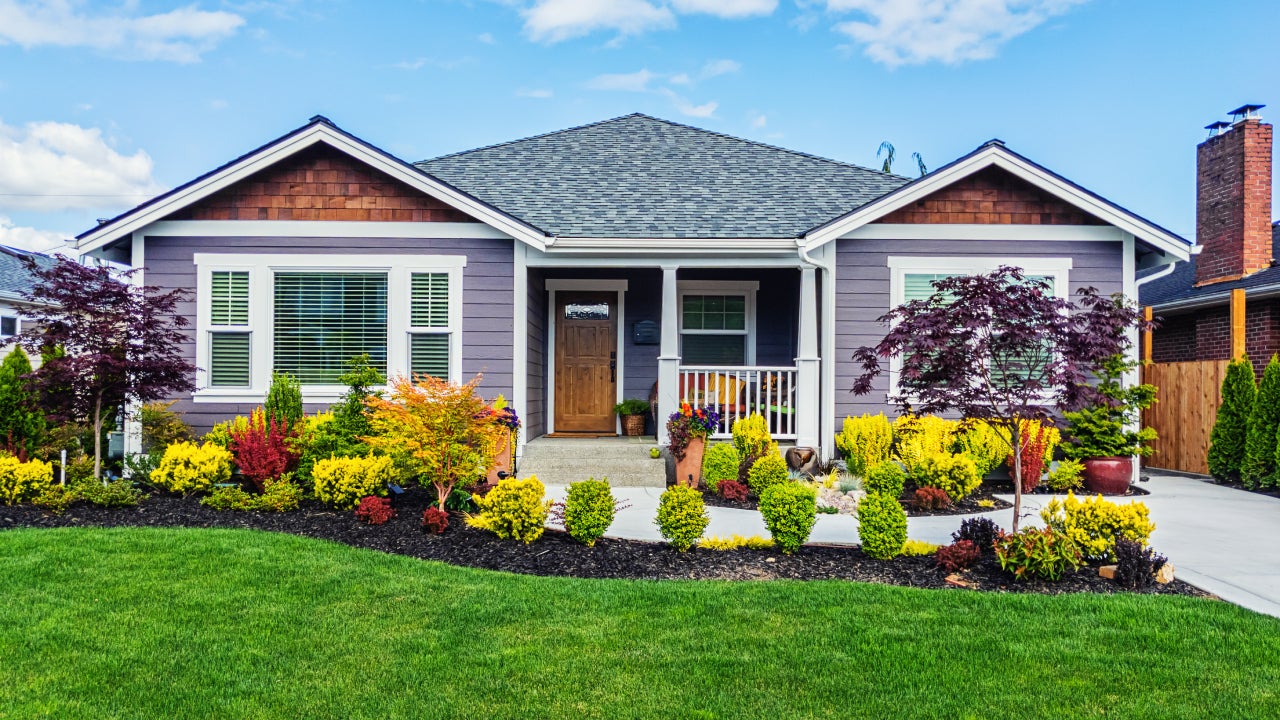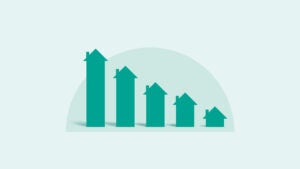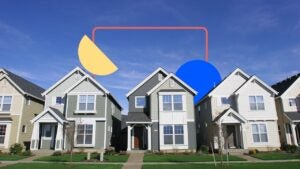Home equity data and statistics: Why they matter to homeowners

Key takeaways
- Just about anyone who owns a home has equity in it — it’s the portion of the property that you own outright, as opposed to being financed or encumbered with debt in some way.
- Your home equity percentage increases as you pay down your mortgage. It can also rise if the home’s worth increases, due to improvements you make or a general uptick in local property values.
- Negative equity means you owe more on your home than it’s worth, which is problematic if you want to sell, refinance or borrow against your ownership stake.
You’ve been hearing a lot about home equity lately for one big reason: There’s a lot more of it. As home prices boomed throughout the pandemic, many homeowners enjoyed some massive appreciation in the size and worth of their ownership stake in their properties.
As a result, the collective value of U.S. households’ equity is $34.5 trillion — close to a record sum. The average mortgage-holding homeowner has approximately $302,000 in equity, according to property data analyst Cotality.
Let’s delve more deeply into home equity statistics — and why they’re significant to anyone who owns a home.
Home equity key terms
- Home equity
-
The difference between how much your house is worth and how much you still owe on your mortgage. For example, if your house is worth $500,000, and you still owe $100,000, you have $400,000 of equity.
- Home equity loan
-
A fixed-rate, lump-sum loan using your home as collateral, also known as a second mortgage. Requirements vary among lenders, but they typically only allow you to borrow up to a maximum of 85 percent of the home’s value (including the amount owed on your first mortgage).
- Home equity line of credit (HELOC)
-
Another way of borrowing against your home equity that uses your home as collateral. Rather than a lump sum of money, it offers a revolving credit line (like on a credit card) that you can draw funds from as you need them, at a variable rate. As the Federal Reserve adjusts its benchmark rate, HELOC rates move up and down, too.
- Negative equity
-
The status of a homeowner whose outstanding mortgage debt is larger than the property’s current worth. For example, if your house’s fair market value is $300,000, but you owe your lender $310,000, you have negative equity.
Current homeowner equity data and statistics
Note: Unless otherwise indicated, figures are as of Q1 2025.
- Nearly half (46.2%) of mortgaged residences are “equity rich,” meaning their outstanding loan balance is less than half the home’s value.
- Of the average $302,000 in equity held by mortgage-holding homeowners, $195,000 is tappable (that is, can be withdrawn while still maintaining a 20% stake in the home).
- A softening in home-price appreciation over the last year has led to a slight drop in equity stakes, with mortgage-holding homeowners losing an average of $4,200 in equity between Q1 2024 and Q1 2025.
- Homeowners in the Northeastern states enjoyed the largest year-over-year home equity gains: Rhode Island ($37K), New Jersey ($36K), and Maine ($20K).
- Homeowners in the West tended to fare less well. The three states posting the biggest annual equity losses: Hawaii (-$66K), Washington (-$12K), and Arizona (-$14K).
- The national aggregate value of negative equity is $350 billion — up by approximately $26.6 billion year-over-year.
- Underwater properties represent 2.1% of all mortgaged residences.
- Home equity lending has increased to its highest level since early 2008: As of Q4 2024, home equity loan originations had jumped 13% year-over-year. HELOC originations rose 8%.
- HELOC debt rose in 2024 by 7.2%.
Why is home equity important?
Home equity refers to the portion of your property that you own outright, free and clear of any debt (“equity” being financial lingo for “ownership”). Anyone who owns a home — whether purchased with cash or financed with a mortgage — has some level of equity in it. If you paid for your place all in cash or have paid off your mortgage entirely, you have 100 percent equity. Conversely, if you made a 20 percent down payment and borrowed all the rest for the purchase, you have only 20 percent equity at the start.
If your mortgage is still outstanding, your home equity is the difference between how much your house is worth and how much you have left to pay on your mortgage. If you still owed your mortgage lender $50,000, say, and your home’s value is $300,000, you’d have $250,000 in equity, approximately.
Understanding how much home equity you have can give you a rough idea of how much of the sales proceeds you’ll receive if you sell the property (after you pay off your mortgage and transaction costs, of course). You can also borrow against your equity stake with a home equity loan or a line of credit (HELOC). These products can help you pay for large expenses — they’re particularly popular to pay for home repairs and renovations — at a relatively lower interest rate compared to other forms of financing.
Home equity over the past 5 years
In May 2025, the national median home price was more than $420,000 (see chart), according to the National Association of REALTORS. That compares to just over $280,000 back in May 2020.
Higher home prices equal higher home values, which means bigger (and more valuable) home equity stakes. As a result of this roughly 50 percent rise in home prices, tappable equity — the amount a homeowner can borrow against while keeping a 20 percent equity stake — has grown by $5.7 trillion, a 100 percent increase. The average tappable equity per borrower has increased by nearly $102,000, according to the ICE 2025 Borrower Insights Survey.
In certain states, homeowners have seen especially large gains in their equity levels. Here are where the biggest equity increases occurred as of Q1 2025, based on Cotality’s research:
- Rhode Island – $37,000
- New Jersey – $36,000
- Massachusetts – $23,000
- Maine – $20,000
- Connecticut – $35,000
- District of Columbia – $30,000
With home equity steadily rising over the past five years across 90 percent of major metro areas, American homeowners have gained significant wealth, averaging nearly $150,000, according to the National Association of Realtors (NAR). While home price growth has begun to slow recently, equity continues to be an extremely valuable commodity for homeowners.
What increases home equity?
There are three basic ways to boost your home’s equity.
1. Keep paying down that mortgage
Every time you make a mortgage payment, you are chipping away at the loan’s balance (the part of the home your lender owns) and augmenting your equity (the part you own). At the start of your mortgage term, a greater percentage of your payments goes towards interest at first, but shifts more towards principal as the years go on. And the amount that goes toward principal translates to an increase in your equity stake.
2. Upgrade your home
Renovations to your home, such as modernizing the bathrooms or adding an in-law suite, often enhance the property’s worth and marketability. Since the size of your mortgage doesn’t change — your lender doesn’t get to share in the home’s appreciation — this increase in value directly accrues to your side of the ownership stake.
3. Stay attuned to local market trends
Your home’s equity can also increase without your intervention. As certain neighborhoods, cities and regions become more attractive, residents benefit, as the surge in interest and purchases elevates asking prices and property values in general.
What is negative equity?
Homeowners have negative equity — also known as being underwater or upside down — when they owe more on their mortgage than their home is worth. For example, if you had an outstanding loan balance of $250,000 and your home appraised for $235,000, you’d be in a state of negative equity.
It’s not a great state to be in. If you decided to sell the property, you wouldn’t make enough from the deal to pay off your mortgage. In fact, it would actually cost you money: Since your debt is bigger than the home’s value, you would have to make up the difference and pay your lender back at the closing.
Refinancing with negative equity is also a problem, because lenders usually won’t let you take out a new loan without any equity in your home. And forget about home equity loans or HELOCs: You can’t borrow against a non-existent stake. Instead, you may need to wait until your home value increases or until you’ve re-paid enough of your mortgage to reach positive equity again.
Though it still represents a fraction of residences (just over 2 percent), the negative equity rate has been rising steadily since 2024.
1.2 million
Source: Cotality Homeowner Equity Report
Final word on home equity facts and stats
Understanding how home equity works, and how to leverage it, is important for any homeowner. The potential to build equity is one of the primary reasons homeownership is so attractive to so many, and remains a steadfast part of the American Dream. Your homeownership stake is essentially an asset that you can eventually tap into or pass down to descendants.
Additional reporting by Maya Dollarhide
Why we ask for feedback Your feedback helps us improve our content and services. It takes less than a minute to complete.
Your responses are anonymous and will only be used for improving our website.
You may also like

How to find a home’s value in 2024








